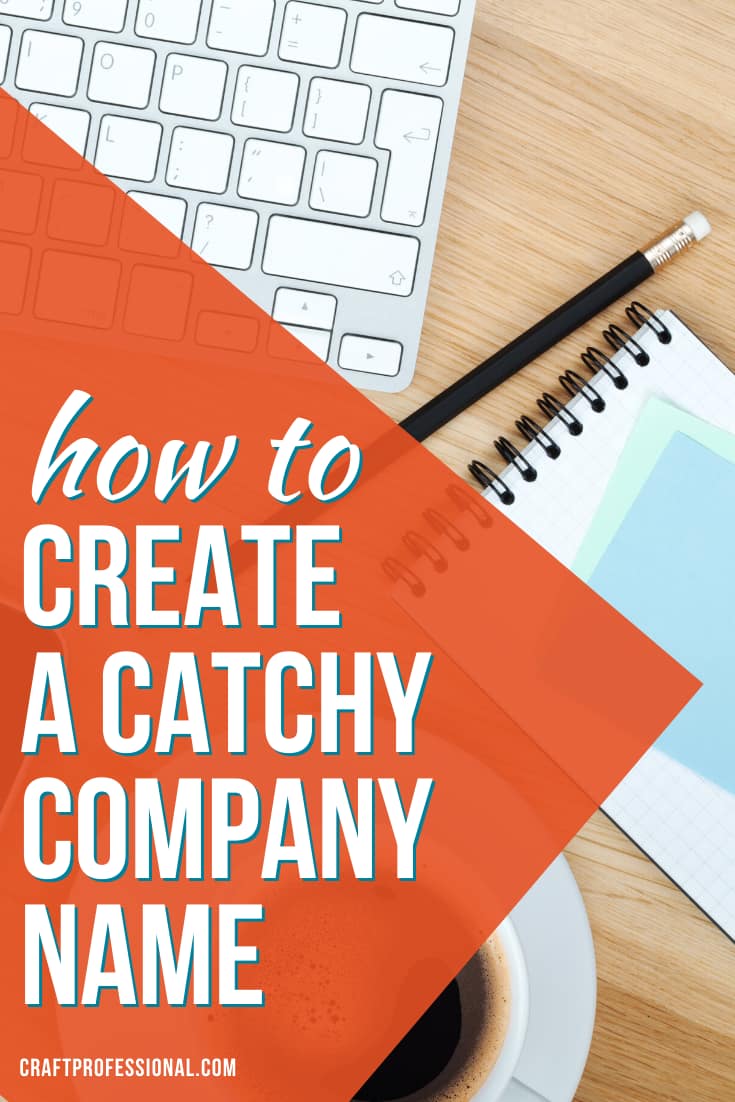- Home
- Marketing Strategies
- Catchy Company Name Ideas
Catchy Company Name Ideas
Create a catchy company name — one your target audience will never forget — with 4 simple techniques.
A great name can be a huge asset to small businesses.
It can keep you at the top of mind for returning shoppers, set you apart from your competition, and help you get better results from your marketing strategy.
Choosing the right name is one of the most important decisions to establish your brand image. Unfortunately, generating unique business name ideas is not an easy task.
The good news is, there are 4 simple elements that aid memory. Include these elements in your company’s name, and you'll have a great start to create a good business name that won't soon be forgotten.
Make Sure You Have a Catchy Company Name
Here's how to create a catchy company name:
- Consider an offbeat and unexpected creative name.
- Use concrete words that summon up images in people's minds.
- Use concepts that are recognized and understood by your target market.
- If you use a made up word, make sure it feels real.
Let's look at each great way to generate memorable business names in some detail.
1. Consider an offbeat and unexpected creative name.
Something a bit unexpected can be the starting point for the perfect name.
People remember things that are a bit offbeat. Business naming expert and author of Brand New Name, Jeremy Miller, says:
"Quirks have an impressive pull on your memory. You notice things that don't fit expectations, and that makes them even more memorable. This is a powerful lesson in branding. Quirks can make names unforgettable."
Be aware of potential controversy
An offbeat name doesn't have to be controversial, but it might be. It may poke fun at something or challenge assumptions.
If you do choose something a bit cheeky for the name of your business, be aware - a name that strikes you as clever or pleasingly thought-provoking may come across to others as insulting or rude.
You'll need to be sure you know your target customers well to be confident they will remember your brand for being clever and not insulting. And if your name might ruffle some feathers, you'll need to be prepared to receive and manage some criticism.
Be niche-appropriate
Some niches are more conservative than others, so some types of businesses will have more latitude than others when it comes to using a unique name that's a bit offbeat.
For the most part, companies in creative niches can get away with being more unconventional. If you're naming an art or craft business, you're probably safe to be a bit quirky.
If you want to create a catchy business name that potential customers will remember, consider something that's fun, funny, or even a bit sassy.
Related: How to Create a Business Name
2. Use concrete words that summon up images in people's minds.
If you need a catchy company name, concrete words are your best friends.
What are concrete words?
Concrete words refer to real, specific items. They describe things that can be directly experienced through one of the five senses.
Abstract words are the opposite of concrete words. Abstract words refer to things that are more general. They typically describe ideas or concepts, and they do not engage the senses.
For example:
When I wrote about characteristics of good business names, I compared the words "unique" and "unicorn" (a word that has come to convey the idea of being wonderfully unique).
"Unique" is an abstract word. It is general. It doesn't engage the senses. "Unique" doesn't conjure up a specific image, smell, sound, taste, or physical feeling (touch).
On the other hand, "unicorn" is a concrete word. It refers to a specific thing and brings to mind a clear visual image. Even though they aren't real, we can all conjure up an image when we encounter the word "unicorn."
Why do cool business names contain concrete words?
Concrete, descriptive words help business owners achieve a lot of the characteristics of good and catchy company names by:
- making a connection to something known
- communicating something specific about your brand image
- engaging the senses
- offering potential to extend the descriptive name into a full-blown theme
- possibly touching desired / positive emotions
Abstract words don't accomplish any of that. That's why abstract words generally don't carry a lot of potential for generating catchy business name ideas, but concrete words can be rich in potential.
Favorite Naming Resources
3. Use concepts that are recognized and understood by your target customers.
We remember new information better when we can connect it to other things we already know.
If you want customers to remember your business name, it's a good idea to use words and concepts they already understand and will connect with your product or service in some way.
Keep in mind, a name may have meaning to you, but you need to ask yourself whether your customer will grasp that meaning. Obscure symbolism or seldom used jargon may be meaningful to you, but if your customers aren't familiar with your references, they won't be able to make that important connection. Your company's name will seem random, and if the name seems completely random, you run the risk that it will be quickly forgotten.
Choose a company name that links to some element of your niche, your products, or your brand's value proposition, and you'll make your name more memorable.
4. If you use a made up word, make sure it feels real.
We already know that familiarity helps make something more memorable. That's one reason brand names that are created from invented words can be tricky. After all, if you use a word that's made up, how will that word be familiar and recognizable to customers?
You can make an invented word meaningful and, therefore, more memorable, by using real words inventively combined with suffixes, and prefixes to create your made up word.
Avoid invented words made from random letter mashups.
You might be able to buy the dot com domain name for a company name that's made up of a random letter mashup, but you'll be stuck with a completely meaningless name that no one will understand or remember.
You definitely need to consider the online presence for your new business. But there are better ways to ensure domain availability.
How to make invented words memorable
Invented words aren't all bad.
They can convey meaning if you create invented, new words using smaller elements that have meaning.
For example:
- Create a compound word. Take two words that are meaningful to your brand in some way, and put them together to make one word that customers will understand.
- Take an existing word that is relevant to your business and add a suffix to the end to create a new word that has meaning.
- Take an existing word that is relevant to your business and add a prefix to the beginning to create a new word that has meaning.
Quick grammar refresher: What are suffixes and prefixes?
A suffix can be added to the end of a word to change the meaning of the word. Some examples of suffixes are: -est, -ful, or -ity.
A prefix can be added to the beginning of a word to change the meaning of the word. Some examples of prefixes are: anti-, ultra-, or mega-.
Keep in mind suffixes and prefixes are not just random letters. They carry meaning, so they give you another opportunity to make the name you choose meaningful to people.
You might invent a word by starting with a real word and adding a suffix or prefix that's not normally associated with that word. In that case, your business name's meaning will come from the meaning of the root word as well as the suffix or prefix you used.
For example:
If you use the suffix "-est" at the end of a made up word, it will signal the meaning "the most."
If you use the prefix "ultra-" at the beginning of a made up word, it will signal the meaning "extremely."
If it's been a while since you've been in English class, and you need some inspiration, check out this list of suffixes and their meanings. The same site also has a helpful list of prefixes and their meanings.
Related: How to Name a Business



New! Comments
Have your say about what you just read! Leave me a comment in the box below.